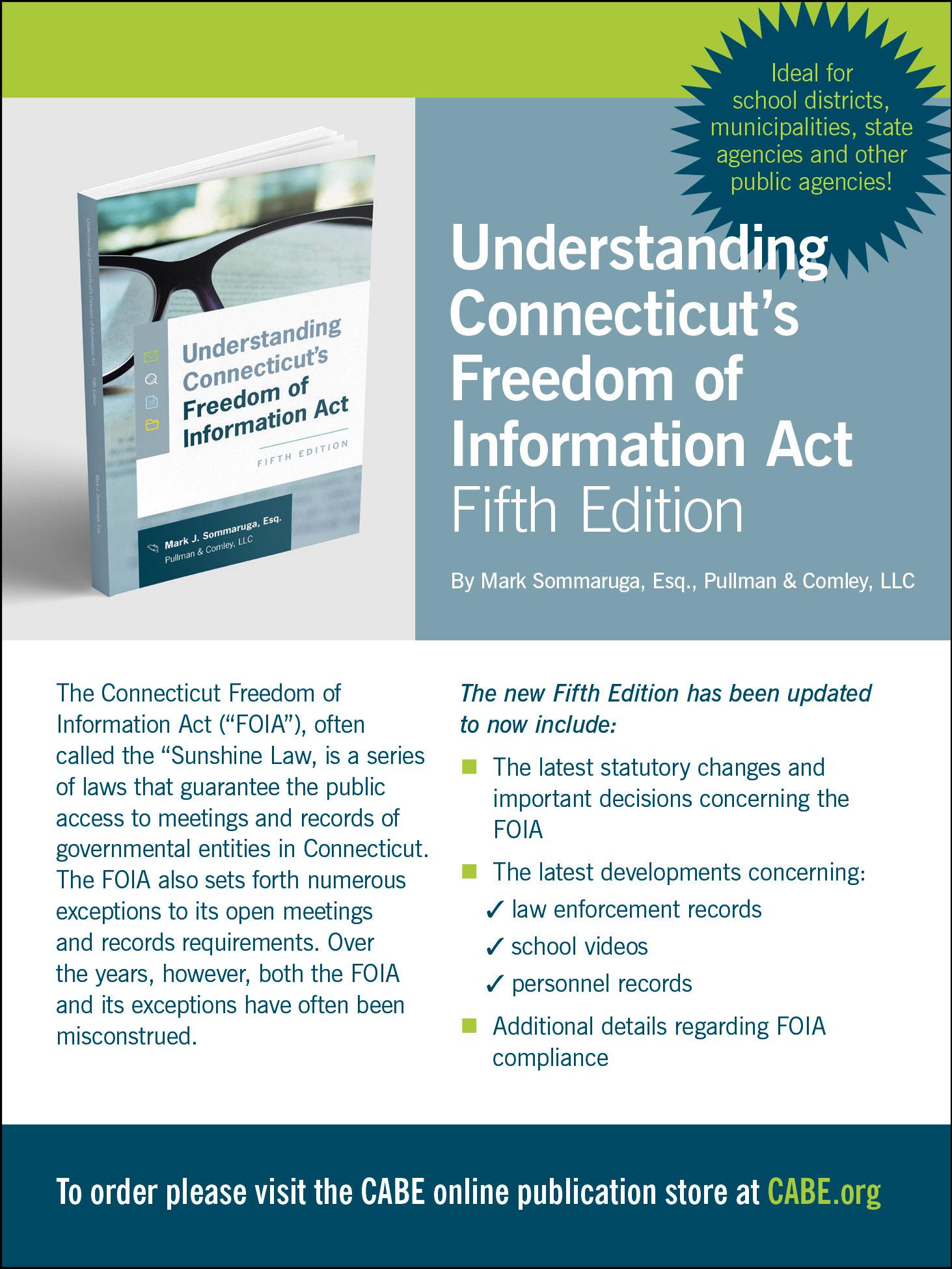
3 minute read
Understanding Connecticut’s FOIA The Attorney-Client Privilege, Opinion Letters, Agendas and Your Bills
Mark J. Sommaruga, Esq. Pullman & Comley, LLC
Connecticut’s Freedom of Information Act (“FOIA”) exempts documents protected by the attorneyclient privilege from its disclosure mandate. Unfortunately, not every communication from your lawyers is protected by the attorney-client privilege and exempt from disclosure under the FOIA. Generally, in order to be protected, the communication between board members (or school district employees) and attorneys must be confidential, made in the course of the professional relationship that exists between the attorney and the district, and relate to legal advice sought by the district from its attorney. In addition, here are some (hopefully) helpful/ practical pointers.
Advertisement
So, what about the bills that we receive from our attorneys (besides having to pay them)?
Connecticut’s Freedom of Information Commission (“FOIC”) and the courts have held that portions of an attorneys’ bill that describe in any detail the nature of work being performed on behalf of a public agency client may be exempt from disclosure. A general statement of the purpose of the work performed may not be exempt from disclosure, but bill entries that reveal the motive of the client in seeking representation, litigation strategy, or the specific nature of the services provided, such as researching a specific area of the law, may be exempt. However, everything else is likely subject to disclosure.
Specifically, information concerning the date of services rendered, the identity of the specific attorney providing the services, hours of service and hourly rate, the amount billed, and (even) the identification of payment by matter name are not viewed to be matters protected by the attorneyclient privilege.
So, how much description do we have to put on the agenda (or motion) when we go into executive session to discuss a written attorney-client privileged communication?
You generally cannot get away with simply putting on an agenda
“discussion of attorney client privileged communication;” you have to provide at least a general description of the subject matter covered by your attorney’s letter. The FOIC and the courts have found that providing some general description of the subject matter of the written legal opinion – for example, that the opinion concerned the superintendent’s contract, or regional school district budget process issues - generally would not violate the attorney-client privilege, and thus is required under the FOIA. The logic for the FOIC requiring some description on an agenda of the type of personnel matter or the general nature of litigation being discussed would also apply to requiring some general statement/description of the attorney’s legal opinion, understanding that there may be a rare case where even the description of the subject matter by itself would actually reveal the nature of attorney-client communications (and need not be provided).
Can attorney-client communications afford us the opportunity to communicate amongst ourselves about employees without having to invite them into executive session or give them the opportunity to demand that we discuss the matter in public? Generally, when you are discussing a personnel matter in executive session, you have to notify the employee(s) being discussed of their right to have the discussion take place in public session in advance of the meeting. However, while a discussion regarding a personnel matter by itself will trigger the rights of an employee to demand that such discussion occur in public session, agencies can avoid this obligation where they are meeting in executive session to consider a written attorney-client privileged communication about the employee (or even a related contractual matter). Of course, it is important to limit any discussion during the executive session to the written communication from your board’s attorney, and not engage in too broad a discussion about an employee’s performance separate and apart from a discussion/ substance of the legal opinion. In addition, there may be other bases for meeting in executive session regarding an employee (for example, if the employee has brought or threatened a lawsuit against the board) that the agency could use instead of the “personnel matters” exemption.
So, how much information can we disclosure from the attorney-client communication without waiving the privilege?
By publicly discussing the details of a legal opinion in any manner (beyond simply stating that the agency secured an opinion and as a result the agency is taking a certain action or believes that it has acted legally), an agency may eliminate the confidential nature of the opinion. As such, if an agency discloses the substance or “gist” of the legal advice or privileged communication, it may have waived the privilege as to the entire communication.
Final Thoughts…
While the attorney-client privilege is still alive and kicking, you still need to act prudently to ensure compliance with the FOIA’s public meeting and public records requirements and take reasonable steps to avoid an inadvertent disclosure of the contents of any privileged communications. While there may be times that you want to have an opinion released to the public (and to broadcast to the world that your attorney has blessed your actions), the attorney may have a different viewpoint, since the opinion could contain items that are best left unsaid publicly from a legal standpoint.
Attorney Sommaruga is the author of “Understanding Connecticut’s Freedom of Information Act” (5th Edition 2018).







